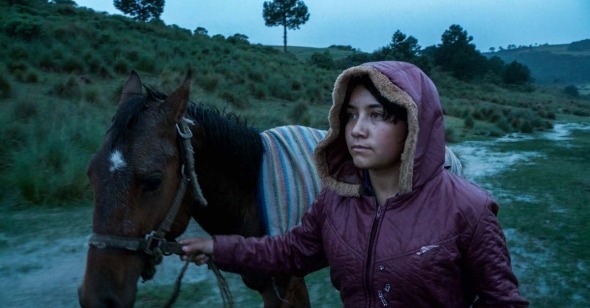Ecopoiesis
By Nicolas Pedrero-Setzer
The Echo
Dir. Tatiana Huezo, Mexico/Germany, no distributor
The Echo screened Thursday, March 14, at Museum of the Moving Image as part of First Look 2024.
With The Echo, the Mexican-Salvadorian filmmaker Tatiana Huezo has returned to documentary filmmaking following her award-winning 2021 fiction debut Prayers for the Stolen. But the distinction between the films is not always discernible. Her newest film is so precisely shot and narratively taut that it convincingly passes as a fictional drama, while her previous effort was so intimate and organically sketched that it often approximated the verisimilitude associated with documentary. Huezo’s experience as a documentarian lent Prayers for the Stolen a vivid feel that showed her preternatural knack for filming space and time in a realist mode, but her approach to her latest work is even more impressive, as it posits that all of her films can be manipulated to pass as works of fiction or nonfiction.
The Echo is a film about El Eco, a remote town in the Mexican state of Puebla. Although the town is only a three-hour drive from the country’s capital, its rhythms are entirely dissimilar from it. El Eco is populated by farmers; the town’s women shepherd, and its men log trees. Its children, to whom Huezo devotes the most screen time, are shown helping their parents with household chores and attending school, but it's the scenes in which they frolic around El Eco and discuss their futures that are the most captivating. In that sense, The Echo shares similarities with films like Chloé Zhao’s Songs My Brothers Taught Me (2016) and Gabino Rodríguez and Nicolás Pereda’s My Skin, Luminous (2019), which also frame their representations of rural, mostly indigenous communities through the eyes of children. Cinematographer Ernesto Pardo’s framing of their small size against expanses of rolling hills and maize fields emphasizes the film’s sense of scale. From their perspective, the vastness of their surroundings feels more cinematic than it ever could via someone taller or older.
This childlike sensibility is not given form by virtue of imaginative flourishes but rather because of their unique material interactions with their surroundings—a simple reflection of the fact that they have more time on their hands than their adult counterparts. While the grown-ups are shearing sheep or cooking meals, the kids are running around swamps and hurling shouts at the wind in hopes of getting a response. One of them provocatively yells, “Cow poop!” and giggles when the wind speaks back. Throughout the film’s main narrative strand, a teenager named Montse is seen grooming her horse in preparation for a town race. It’s a notably male event and her mother is adamant that she not attend, partly out of concern for her safety. Her reasons echo a passing statement made earlier in the film, in which a young man instructs his young son not to carry his plate back to the kitchen after he’s finished his meal because “that’s what women are for.” After more disagreements with her mother, Montse leaves town. In her mother’s eyes, she was always a “real rebel.”
Huezo identifies a clear break in tradition between the town’s young girls and its older women. In an early scene, one girl asks her mother when she got married and she replies, “Around when I was 14.” A few seconds later she adds, “I won’t deny it or say that I regret it, but it’s best you study first and learn all you can about life.” The girls’ situation is entirely different from that of their mothers. Perhaps it’s a product of schooling programs once lacking in the region or cultural osmosis. Yet it’s evident from their willingness to challenge the men in town, questioning rules their fathers expect them to accomplish instinctually––cooking, cleaning, while the mothers tend to remain silent—that something has shifted generationally.The Echo is not only about a remote town but also about remoteness between the people who live there—the distance between generations—and what it means to express a difference of opinion in such a small community.
When Montse shares that she might enlist in the army when she grows up because she wants to “discover new places, earn money, and not wait for someone to always provide for me,” her closest friend replies, “What if you become a killer?”, expressing her perception of the limited possibilities outside of town. There are two divergent strands shown in The Echo: the first corresponds to the town and its preservation, while the second belongs to its youth and their ways of exploring and thinking about the world. Much like an echo, things are not the same once they reach the wider world—enough time and space inevitably produces a transformation.
